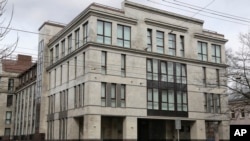A secretive Russian agency designed to flood the Internet with pro-Kremlin and anti-U.S. comments and posts has been brought into the public eye as a result of a lawsuit brought by a former employee.
In a Russian court, Lyudmila Savchuk sued the Agency for Internet Studies, or AIS, on a variety of charges, including labor violations and lack of payment.
In her suit, Savchuck said she worked at AIS for two months before quitting in March. She alleged she wasn’t paid for her work, was forced to work over-long hours, and is now on a campaign to shed light on AIS activities.
In a surprise move, the suit was quickly settled in late June when lawyers for AIS offered Savchuk a payment of 10,000 rubles.
'Troll factory'
Savchuk accepted the settlement, telling the French news agency: “I am very pleased. They pretended they don't exist at all and now they have come out of the shadows for the first time.”
Savchuck also said she will only feel she fully won “after the troll factory closes completely."
Based in a non-descript warehouse in St. Petersburg, the AIS is a round-the-clock operation that reportedly employs more than 300 workers.
AIS employees create fake accounts on social media and news websites, and then use those accounts to post thousands of comments and posts in accordance with the daily pro-Kremlin talking points, creating the illusion of widespread support for Vladimir Putin’s government.
In her suit, the 34-year-old Savchuk called the AIS a “troll factory,” a reference to the 30,000 comments produced daily by AIS employees.
Many of those comments, she said, are inflammatory in hopes of luring out, or “trolling,” even harsher replies. Those caustic arguments can then be used by the Kremlin as an excuse to ban anti-Putin or pro-Ukranian bloggers and websites.
Authorities in Moscow have declined to comment on the agency.
AIS operations remain shadowy, as do its funding and control.
Funding
Officially, AIS is run by Mikhail Bystrov, a retired police colonel.
But RFE/RL has reported that AIS is financed through a holding company headed by Evgeny Prigozhin.
Officially Putin’s “personal chef,” Prigozhin has previously been implicated by the newspaper Novaya Gazeta in another media scandal: this time an elaborate conspiracy to plant false information in different Russian newspapers, disguised as advertisements.
The Kremlin has long operated propaganda campaigns, but since the conflict in Ukraine, Russian authorities appear to have kicked their online efforts into higher gear.
Savchuk said she and others in her department routinely worked 12-hour shifts, banging out as many as 150 blog posts per shift. Others swamped the Web with phony images and fake, pro-Putin “news” stories created to turn up in Web news searches.
Another trolling tactic employed by AIS is the posting of conspiracy theories, designed to muddy facts and leave readers feeling confused.
Conspiracy theories
A few examples were the many conspiracy comments implicating the U.S. in the recent murder of Boris Nemtsov, the ouster of former Ukrainian president Viktor Yanukovych, and the downing of Malaysian Airlines Flight 17 over rebel-held territories in Ukraine.
“Lena N”, another former AIS employee, recently told RFE/FL that she quit her job after refusing to tow the company line about Nemtsov’s murder.
"It was necessary to bring people to believe that the killing of Boris Nemtsov was a provocation before the march, and [that it was] a murder carried out by his own [supporters]," she said.
And even though her suit was dismissed once she accepted the settlement, Savchuk said she’s committed to shining a light on AIS and other similar operations.
Speaking through her attorney, Ivan Pavlov, Savchuk said she hoped to meet with AIS officials in July for “another chance to make their activities transparent.”





